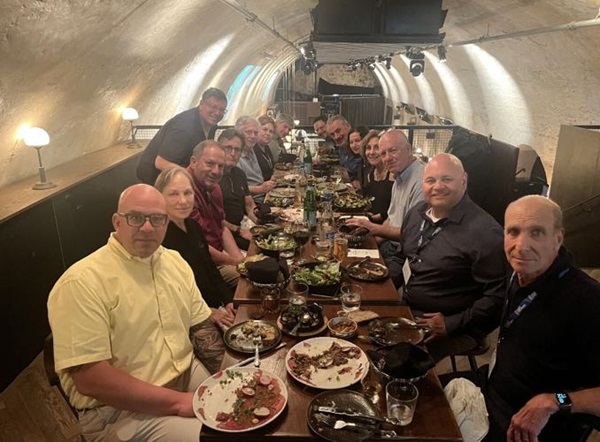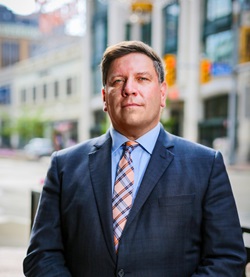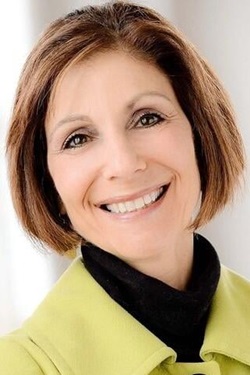07/12/2024
Federation Offers Business, Civic Leaders Firsthand Look at Israel Post-Oct.7
- Share This Story

Members on the mission trip to Israel with the Jewish Federation of Cleveland at dinner. Submitted Photo.
KAITLYN FINCHLER | CJN
Article reprinted with permission from Cleveland Jewish News
To allow more people to engage in Jewish life and learn more about the current state of Israel, the Jewish Federation of Cleveland took business and civic leaders in Cleveland of various religious faiths to Israel from April 13 through April 16.

Cimperman
Geri Presti, president and CEO of The Music Settlement, told the Cleveland Jewish News the purpose of the trip was to “bear witness” and learn about the events in the aftermath of the Oct. 7, 2023, Hamas terrorist attack on Israeli people and property.
“It was not a sight-seeing pleasure trip necessarily, with that focus,” Presti said. “I thought the Federation thoughtfully planned an itinerary that gave us many different experiences to try to relive the events of that day.”
The trip, led by Federation President Erika B. Rudin-Luria, allowed participants to meet with the families of hostages and missing people, Presti said.
“One of the most difficult days was to witness when we visited Kibbutz Kissufim,” she said. “We saw the home of Shlomo Mansour and we heard his daughter’s story about his kidnapping. He’s the oldest hostage and he has not been returned to the United States or to Israel.”

Presti
The same day, Presti said, they visited the Nova music festival site, which was “heart-wrenching,” and paid tribute to the 370 lives lost and 40 people kidnapped by Hamas.
“(The trip) was just to get a well-rounded experience to listen, see and witness what happened that day,” Presti said of her first time in Israel. “It’s very focused on Oct. 7.”
Joe Cimperman, president and CEO of Global Cleveland, told the CJN it’s important to experience “as much as we can” firsthand. He has been to Israel before on the Adler Civic Leaders Mission and other trips.
He said there were three moments “that really stood out” to him, the first being hearing from Canadian-Israeli journalist and author Matti Friedman, who used to write for The Associated Press, The New York Times and The Washington Post.
“He talked about the perceptions of what’s happening in Israel and Gaza now,” Cimperman told the CJN. “And what the reality is and the perceptions of the relationship between the people of Palestine and the people of Israel, and the reality and the perceptions between the Jewish community and the Islamic community.”
Cimperman also said Friedman noted how there are over 30 reporters for AP in Israel, yet five for the entire continent of Africa.
“He said, ‘I want to talk to you guys about the war between America and Italy,’” Cimperman said. “He started naming battles and everyone in the room is like, ‘What is this guy talking about?’ And he goes, ‘Oh, I’m sorry. You all call it World War II.’”
Cimperman said Friedman suggested people’s idea is the war is between Israel and Palestine, but “we are proxy in a much larger conflict.”
Another moment that stood out for Cimperman was the story from retired Israel Defense Forces Gen. Noam Tibon, who drove with his wife from Tel Aviv to the pastoral Kibbutz Nahal Oz, to save his son, Haaretz journalist Amir Tibon, and his family. According to The Times of Israel, partway through the drive, at Kibbutz Mefalsim, Noam Tibon came across a firefight between a Hamas cell and soldiers from the elite commando unit, Maglan.
“What he said was that he thought everybody above a certain level of government should have been fired because of the failures,” Cimperman said. “Not just the failures of the military, the failures of diplomacy, of statesmanship, of preparedness. ... It was very sobering to hear someone who has dedicated his life to Israel, who’s spent so much time in the military ... How he was completely holding everyone accountable.”
Presti said the thought of the trip was “worrisome at first” because of Iran’s threat to retaliate against Israel and people asked her why she would go to Israel if she didn’t have to.
“It was a time during my faith’s Lent season and I really felt a strong calling that I needed to make this trip,” Presti said. “To learn from the people and it was not just trying to understand what happened there through reports of the news and social media. But to really go there, bear witness and hear from the people themselves, and to learn on the ground what really occurred on that devastating day.”
Rather than taking home something tangible, Cimperman said he’s brought back an “awareness,” especially after speaking with Palestinians in the West Bank. The Palestinians they spoke to said they don’t “even believe in a two-state solution anymore,” and just want to be citizens of one country – Israel.
“I was talking to one of the guys and he said, ‘You know us Palestinians, we’re the Jewish people of the Arab world. Nobody wants us – Jordan doesn’t want us, Egypt doesn’t want us, Saudi Arabia doesn’t want us,’” Cimperman said. “It was really interesting in his perspective, ‘What do the Jewish people and the Palestinian people have in common?’ It’s this sense of ‘being othered,’ of being unaccepted by the majority of whatever society you try to be a part of.”
Since there are people experiencing trauma in Israel, Presti said, it makes her worried about the significant rise in antisemitism. In her work at The Music Settlement, the therapy center deals with people with physical, neurological, behavioral and other challenges.
“It was important to share my experience,” Presti said. “I came back here because antisemitism is similar to any other prejudice ... and everything else that goes on here.”
The Music Settlement works to be very inclusive, Presti said, and she shared her experiences in Israel “immediately” with her diversity, equity and accessibility committee, as well as the board members, faculty and staff.
“As we counted my experiences and my observations, and explained to them the situation between the Israelis and Palestinians is so complicated and there’s no simple solution,” Presti said. “We can sit here in the United States and think we know what the solution is or how to solve all this, but it’s so complex, and there’s pain and suffering on all sides of the equation.”
Presti said she wasn’t concerned for her safety during the trip because she “really trusted” the Federation.
“When we were leaving dinner, when we understood that Iran had starting launching over 300 missiles, they explained to us what was going on,” Presti said. “We had an Israeli army former general with us explain the different types of missiles ... but our Federation leaders advised us how to respond.”
Cimperman said while the missiles were being launched, what he saw was not the same as what people back home saw.
“What we were being sent, in terms of screenshots, from our family and friends overseas to Israel, was not what we were experiencing in Tel Aviv,” he said.
A common theme Cimperman said he saw among Israelis following the Oct. 7 Hamas attack, was “how do you end this endless war” and while the Israeli people are proud of their land and heritage, they are not happy with its government, and the two are not mutually exclusive.
Presti said the trip was a “huge bonding experience” and was one of the most “intense and meaningful” experiences of her life.
“I hope to return to Jerusalem and Bethlehem and see other sites that I’ve thought about for many years,” she said. “I’m still processing what I’ve witnessed, learned and experienced. It’s going to be a long process of reflection and how I can use this to help people understand here what happened that day, but also maybe help the people over there.”
Cimperman said Cleveland has “endured a lot of conflict” with a lot of history to look at, but “eternal war, eternal carnage (and) eternal terror” doesn’t have to be the way to move forward.
“I keep thinking, ‘How do we in our own relationships with people, make sense of what’s happening,’” he said. “But also think about what needs to be in place that that never happens again.”

